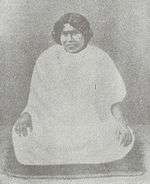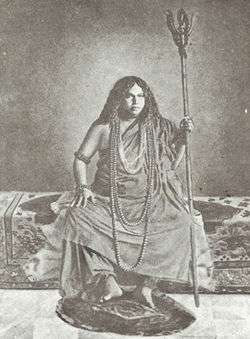Pranavananda
| Swami Pranavananda | |
|---|---|
|
Swami Pranavananda | |
| Born |
Binode Bhuia 29 January 1896 Bajitpur, Madaripur(Faridpur) District, Bengal, British India |
| Died |
8 February 1941 (aged 45) Kolkata, Bengal, British India |
| Nationality | Indian |
| Founder of | Bharat Sevashram Sangha |
| Guru | Yogiraj Baba Gambhirnathji Maharaj |
Swami Pranavananda (Bengali: স্বামী প্রণবানন্দ) also known as Yugacharya Srimat Swami Pranavananda Ji Maharaj, (29 January 1896 – 8 February 1941)[1] was the founder of the organization known as the Bharat Sevashram Sangha.[2] He is remembered for his pioneering efforts to bring the modern Hindu society into the new age without compromising the essential values of ancient traditions of Hindu spirituality. Swamiji was one of the greatest spiritual leaders of modern India. He is still revered very much for his message of universal love, compassion for all humanity and social reform without giving up the nationalist zeal, the love of mother land.
Early life

He was born on 29 January 1896, the auspicious day of Maghi Purnima (16th Magha, 1302), in Bajitpur, a village in Faridpur District in undivided India (presently in Bangladesh). His parents Vishnu Charan Bhuia and Saradadevi were very pious and blessed by Lord Shiva to have a son for the mitigation of human suffering and universal emancipation. He was affectionately named Jaynath by his father at birth and later in his boyhood he was called Binode. Binode showed uncommon philosophical inclinations since childhood and often could be seen in deep contemplation at the village school. He was popular with the children of the locality because of his helpful nature.[3]
Meeting Guru
He visited Gorakhpur in 1913 and met Yogiraj Baba Gambhirnathji Maharaj. This meeting proved to be a landmark event in his life and he was formally initiated by Baba Gambhirnathji Maharaj into the world of spirituality.
Bharat Sevashram Sangha
Pranvananda launched a mission to carry out social services and spread his spiritual ideas in the tradition of Hindu (Sanatana Dharma) religion. The mission took a formal shape as Bharat Sevashram Sangha on the Maghi Purnima day in the year 1917. He wanted this organization to strive tirelessly and selflessly to awaken and unite all sections of the people to build strong India. Overseas missions were also founded to spread the traditional Hindu message of universal love and devotion to all humanity. The Sevashram built many cottage industry centres, monastic schools, primary schools and free dispensaries in urban and rural areas in east India. Branches were started in different parts of the country for various humanitarian tasks, including relief work at the time of flood, famine, earthquake and pestilence. One can not fail to notice the [Bharat Sevashram Sangha] volunteers dressed in saffron robes and wearing traditional Hindu turbans at every major religious or cultural congregations and fairs, guiding devotees, pilgrims, tourists and lending helping hand to local civic authorities in traffic management. They also run many non-profit guests houses, clinics and hospitals all over India, helping anybody that shows up to seek help, irrespective to any discrimination of religion, caste and creed.
Works
He was a great source of inspiration to many freedom fighters of India, extending moral and material help to them. He worked tirelessly till the last day of his life (8 February 1941) — awakening, uniting, and strengthening the people of India. The great Acharya propagated practical spirituality in preference to theoretical philosophy. Though the literature on his teaching is not elaborate, the essential truths have been codified as the "Sangha Geeta". This book offers adequate guidance to his followers in achieving self-realization. He emphasized in the ideals of sacrifice, self-discipline, truth, and continence. He urged his followers to shun all idleness, procrastination, slumbering habits and lust.
Literature
- Ninian Smart and Swami Purnananda: Prophet of a New Hindu Age. The Life and Times of Acharya Pranavananda. George Allen & Unwin, London/Boston/Sidney 1985, ISBN 0-04-922032-2.
See also
References
- ↑ Library of Congress Office, New Delhi (1981). Accessions List, South Asia. E.G. Smith. p. 90. Retrieved 14 December 2012.
- ↑ Subodh Kapoor (1 July 2002). The Indian Encyclopaedia: Biographical, Historical, Religious, Administrative, Ethnological, Commercial and Scientific. Indo-Pak War-Kamla Karri. Cosmo Publication. pp. 6887–. ISBN 978-81-7755-257-7. Retrieved 14 December 2012.
- ↑ Hindu Regeneration Bharat Sevashram Sangha, Hyderabad Branch - 1978 - Volume 8 - Page 67 "This child of Vishnu Charan Das and Sarada Devi was popularly called Vinod. But who could then assume that this Vinod would one day become Swami Pranavananda and materialize dreams of Swami Vivekananda? Yet it is strange that ..."
Further reading
- Shantananda (Swami.) (1975). Acharya Pranavananda in the eyes of the learned. Bharat Sevashram Sangha.
